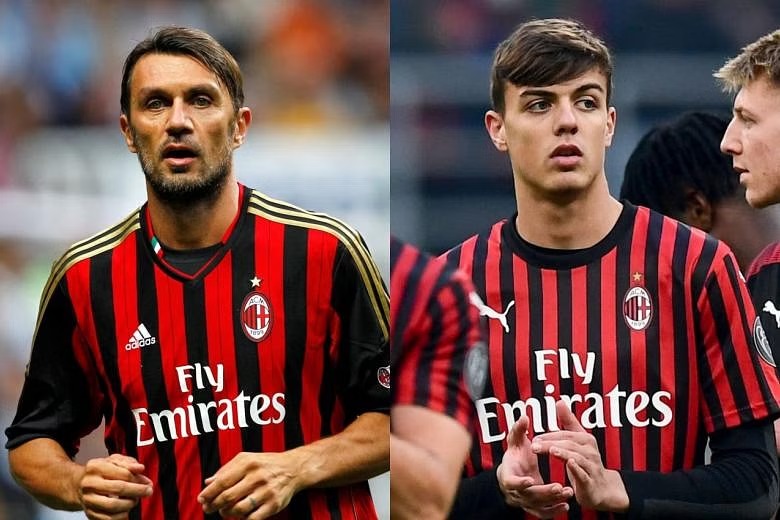Paolo Maldini wasn’t even born when Cesare, his father, lifted the European Cup in 1963. By the time he came into the world in 1968, Cesare was two years into retirement after a career that scaled legendary heights. AC Milan were the first Italian team to win the European Cup, forerunner of the present-day Champions League, and it was Cesare that wore the captain’s armband that night at Wembley as Milan came from a goal down to end Benfica’s quest for a hat-trick of titles.
Growing up, Paolo knew all about his father’s legacy. There was no way you could play for Milan and be ignorant of it. Having started his career with Triestina, Maldini Senior spent 12 seasons with Milan, wearing the famous red-and-black shirt 412 times. Thrown in at the deep end at the age of 16 in a match against Udinese, many wondered whether young Paolo could ever live up to the standards set by his illustrious father.
They needn’t have worried. As a 17-year-old, he was already impressive enough to become a starter in the XI, playing 40 times – mostly at right-back – in the 1985-86 season before he had even turned 18. By the time he hung up his well-worn boots a quarter-century later, Paolo had turned out for Milan 902 times, more than twice as many appearances as Cesare. He had also been part of two legendary sides, a generation apart.
The first, magnificently coached by the peerless Arrigo Sacchi, redefined how football was played in the late 1980s. Carlo Ancelotti was one of the key players in that team, and more than a decade later, it would be his coaching that led Milan to Champions League glory in 2003 and 2007, either side of that scarcely believable defeat to Liverpool in Istanbul in 2005.
Maldini lifted the Champions League trophy – the Cup with Big Ears – twice, once more than his father, and was part of teams that won it on five occasions. Rather than being intimidated by his father’s fantastic career, he used his experiences – Cesare also coached him in the Italian Under-21s – to become an even more accomplished player.
Most sons, however, have struggled to match their fathers. Jordi Cruyff had spells at both Barcelona and Manchester United, though he never became a certain starter for either. But he was damned with faint praise throughout his career because he could never be Johan Cruyff, the creative inspiration at the heart of the greatest Total Football sides.
Enzo Zidane, now 28, is another who has had an itinerant career. The irony of Jude Bellingham, an Englishman, recently being given Zidane’s famous No.5 jersey by Real Madrid would have escaped no one. Like his father and Bellingham, Enzo Zidane is also a midfielder. But unlike them, it seems fairly certain that he’ll never make it at the highest level.
Perhaps the most interesting sporting dynasty of all are the Noahs, of Cameroonian ancestry. Zacharie, who passed away in 2017, was the trailblazer, winning the Coupe de France as a footballer in 1961. Yannick, his son, remains the last French winner of the men’s singles at Roland Garros, after he upset Sweden’s Mats Wilander in the 1983 final.
And just as Yannick avoided comparisons with his father by taking up an altogether different sport, so did his son. Joakim Noah was drafted by the NBA’s Chicago Bulls in 2007, and was twice named in the All-Star team in a distinguished career. Defensive Player of the Year in 2014, he too thrived away from his father’s shadow, on a hardwood floor rather than red clay.
The United States of America has seen the Manning dynasty in American Football, with Peyton and Eli both winning the Super Bowl twice a generation after Archie had played professionally. Ken Norton Junior, whose father defeated Muhammad Ali, was also a star on American Football’s Gridiron.
These few examples clearly show that having a sporting legend as a father can be both blessing and curse. It depends very much on both generations, and how they deal with the thorny subject of legacies. With the Maldinis, mutual regard and respect went hand-in-hand with friendship. That was very evident in the letter that Paolo wrote for his father, along with his siblings, when Cesare passed away.
“We just want to thank you for the wonderful and unique journey we had together,” it said. “It will make us smile every time we think of you. We were close in every moment, not knowing that you were going.
“When you left us, an extraordinary thing happened: we were inundated with messages of affection for you, not banal sentiments, touching ones. You left a little bit of yourself in all these people.”
What better Father’s Day message could you leave for your child?
- Also Read: My Father’s Son, my Own Person




